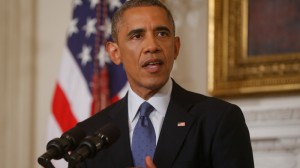US allies pledge support for Iraq, but no military action

President Barack Obama speaks about the situation in Iraq in the State Dining Room at the White House in Washington, Thursday, Aug. 7, 2014. Obama says he’s authorized the U.S. military to carry out airstrikes in Iraq against Islamic militants if they advance toward the city of Erbil. AP Photo/Charles Dharapak
PARIS — As US President Barack Obama ordered his warplanes back to Iraq to prevent a potential genocide, Western allies appeared more reticent, limiting their contribution to promises of humanitarian aid and expressions of diplomatic outrage.
Responding to a UN Security Council plea for the international community to help Iraq cope with a flood of refugees prompted by a jihadist offensive, Obama said the United States could strike Islamic State (IS) militants if they advance on Arbil, where Washington has a diplomatic presence.
A US defense official confirmed that planes had already dropped “critical meals and water for thousands of Iraqi citizens” and vowed further drops if needed.
But just hours after Obama pledged potential military strikes, Britain, which joined the US-led invasion of Iraq in 2003, moved swiftly to rule out a military intervention of its own.
Prime Minister David Cameron stressed that he “fully agreed” with Obama that “we should stand up for the values we believe in — the right to freedom and dignity, whatever your religious beliefs.”
Article continues after this advertisementNevertheless, a Downing Street spokesman emphasized: “We are not planning a military intervention.”
Article continues after this advertisementFrance, which opposed the 2003 invasion, vowed “support” for those fighting the militant advance in Iraq but has not specified what form that might take.
President Francois Hollande held telephone talks late Thursday about Iraq with the head of the Kurdistan Regional Government, Massud Barzani, and “confirmed that France was available to support forces engaged in this battle”.
Hollande and Barzani “expressed their willingness to cooperate to block the offensive carried out by the Islamic State in the northeast of Iraq,” according to a statement from the French leader.
‘It’s not enough’
Germany, which also opposed the 2003 war, vowed to boost its humanitarian aid by 2.9 million euros ($3.9 million) and pledged more help if needed.
“It is clear that is not enough and we have to see what we can do beyond that,” Foreign Minister Frank-Walter Steinmeier said in a statement.
“The killing, systematic forced displacement and forced conversion of Christians, Yazidis and members of other minorities by… terrorists in Iraq represent a new dimension of the horror,” Steinmeier said.
“We condemn these despicable crimes, targeted at entire communities, in the strongest terms.”
However, as Western governments condemned the horror, charities and experts warned that the response was too little, too late.
British charity Save the Children said it had never seen such a rapid displacement of people as in the past two months in Iraq, with 1.2 million people fleeing their homes, and called for unfettered humanitarian access to the worst affected areas.
The charity’s country director, Tina Yu, said: “We’re seeing children and families who’ve fled their homes, often in the middle of the night, fearing for their lives and with nothing but the clothes on their backs.”
Jean-Charles Brisard, an independent terrorism consultant, said France’s response in particular had been “cosmetic”.
“France and its European partners have made declarations of intent but there has been no action,” he told AFP.
“We’re now trapped because we’ve waited too long against very well structured groups.”